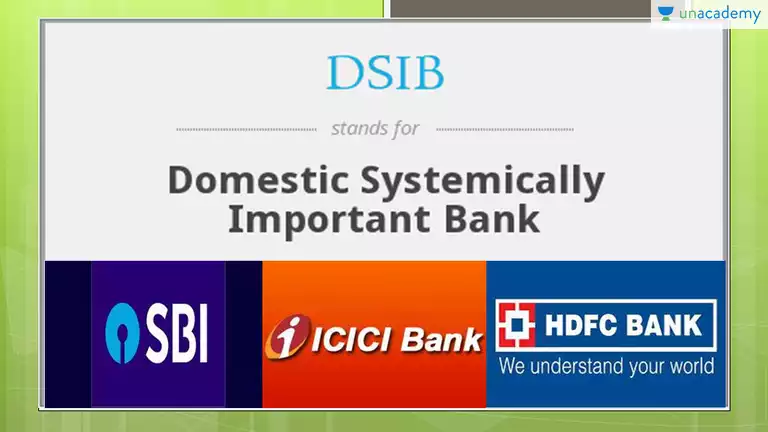Ahmedabad
(Head Office)Address : 506, 3rd EYE THREE (III), Opp. Induben Khakhrawala, Girish Cold Drink Cross Road, CG Road, Navrangpura, Ahmedabad, 380009.
Mobile : 8469231587 / 9586028957
Telephone : 079-40098991
E-mail: dics.upsc@gmail.com

News: The failure of Silicon Valley Bank and Signature Bank in the US raises questions on the safety of depositors' wealth everywhere. Such failures are unlikely in the Indian system. Also, RBI has classified SBI, ICICI Bank, and HDFC Bank as D-SIBs — these banks have to earmark additional capital and provisions to safeguard their operations.
→ A reason why an SVB-like failure is unlikely in India is that domestic banks have a different balance sheet structure. For example, we don’t have a system where deposits are withdrawn in such bulk quantities.
→ Household savings constitute a major part of bank deposits in India — this is different from the US, where a large portion of bank deposits are from corporates.
→ RBI has classified SBI, ICICI Bank, and HDFC Bank as D-SIBs. They need to maintain additional common equity tier 1 (CET1).
→ The additional CET1 requirement was in addition to the capital conservation buffer. It means that these banks have to earmark additional capital and provisions to safeguard their operations.
→ The Basel, Switzerland-based Financial Stability Board (FSB), an initiative of G20 nations, has identified, in consultation with the Basel Committee on Banking Supervision (BCBS) and Swiss national authorities, a list of global systemically important banks (G-SIBs). There are 30 G-SIBs currently, including JP Morgan, Citibank, HSBC, Bank of America, Bank of China, Barclays, BNP Paribas, Deutsche Bank, and Goldman Sachs. No Indian bank is on the list.
→ First, a sample of banks to be assessed for their systemic importance is decided.
→ Banks are selected for computation of systemic importance based on an analysis of their size (based on Basel-III Leverage Ratio Exposure Measure) as a percentage of GDP.
→ Banks having a size beyond 2% of GDP will be selected in the sample.
→ During the 2008 crisis, problems faced by certain large and highly interconnected financial institutions hampered the orderly functioning of the global financial system.
→ Government intervention was considered necessary to ensure financial stability in many jurisdictions.
→ SIBs are perceived as banks that are ‘Too Big To Fail (TBTF)’, due to which these banks enjoy certain advantages in the funding markets.
→ While the Basel-III Norms prescribe a capital adequacy ratio (CAR) — the bank’s ratio of capital to risk — of 8 per cent, the RBI has been more cautious and mandated a CAR of 9 per cent for scheduled commercial banks and 12 per cent for public sector banks.
The impairment or failure of one bank could potentially increase the probability of impairment or failure of other banks if there is a high degree of interconnectedness (contractual obligations) between them.

Address : 506, 3rd EYE THREE (III), Opp. Induben Khakhrawala, Girish Cold Drink Cross Road, CG Road, Navrangpura, Ahmedabad, 380009.
Mobile : 8469231587 / 9586028957
Telephone : 079-40098991
E-mail: dics.upsc@gmail.com
Address: A-306, The Landmark, Urjanagar-1, Opp. Spicy Street, Kudasan – Por Road, Kudasan, Gandhinagar – 382421
Mobile : 9723832444 / 9723932444
E-mail: dics.gnagar@gmail.com
Address: 2nd Floor, 9 Shivali Society, L&T Circle, opp. Ratri Bazar, Karelibaugh, Vadodara, 390018
Mobile : 9725692037 / 9725692054
E-mail: dics.vadodara@gmail.com
Address: 403, Raj Victoria, Opp. Pal Walkway, Near Galaxy Circle, Pal, Surat-394510
Mobile : 8401031583 / 8401031587
E-mail: dics.surat@gmail.com
Address: 303,305 K 158 Complex Above Magson, Sindhubhavan Road Ahmedabad-380059
Mobile : 9974751177 / 8469231587
E-mail: dicssbr@gmail.com
Address: 57/17, 2nd Floor, Old Rajinder Nagar Market, Bada Bazaar Marg, Delhi-60
Mobile : 9104830862 / 9104830865
E-mail: dics.newdelhi@gmail.com